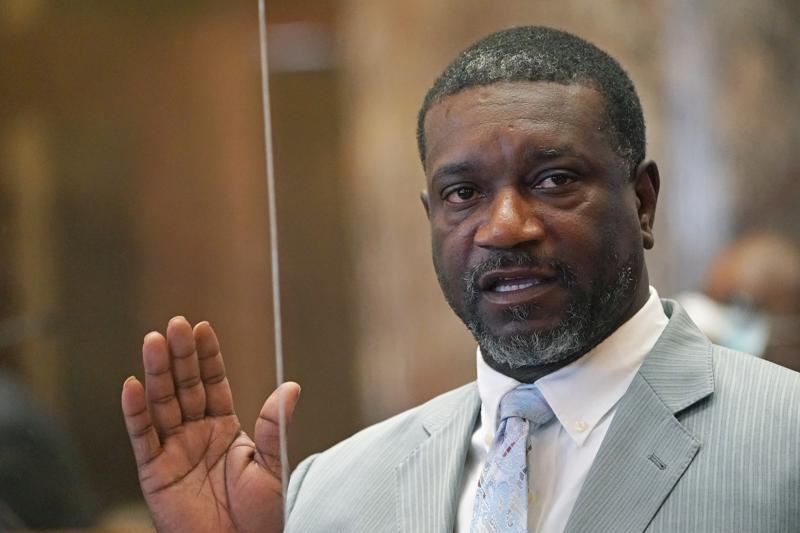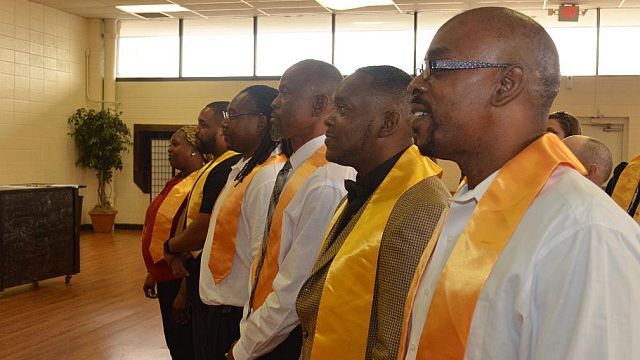Mississippi examines help for departing inmates

A Mississippi law that took effect July 1 expands parole eligibility, and lawmakers are looking at programs that could help people make the transition from prison back into the free world. House and Senate committees met Wednesday at the state Capitol to gather ideas from several people, including prison and parole officials in Alabama, a leader of a nonprofit group that helps former inmates, and an executive of a software company that coordinates services for people leaving prison. One common theme in the presentations was that people who have been incarcerated fare better in the next phase of their lives if they receive guidance in practical matters such as getting a driver’s license, finding a place to live, and finding a job. “We need to make sure that we try to equip individuals with as much as we possibly can when they come back into society, so they don’t go back into the place they came from,” Senate Corrections Committee Chairman Juan Barnett, a Democrat from Heidelberg, told The Associated Press on Friday. “It’s one of those things that we really, really need to tackle.” House Corrections Committee Chairman Kevin Horan, a Republican from Grenada, said Friday that Mississippi needs to improve transitional housing for people leaving prison. He also said legislators also could consider creating reentry courts to provide supervision and guidance for departing inmates. Jefferson Dunn, commissioner of the Alabama Department of Corrections, told Mississippi lawmakers that his state develops a “programming plan” for each inmate who enters the prison system, with a goal of preparing them to leave when they are paroled or when they reach the end of their sentences. “Reentry begins with entry,” Dunn said. “We have reworked our entry process to begin that process of reentry, whether it is three years or 30 years or longer, in the department. … We want to begin from Day 1 to have inmates look towards reentry and view their time of incarceration as an opportunity and everything that they do to move them closer to reentry.” Louise Wasilewski is CEO of Acivilate Inc., an Atlanta-based company whose software coordinates communication for what she calls “returning citizens” — people leaving prison. She said the company has contracts in other states but not in Mississippi. “We do really simple things like helping people sort out all the activities they have to do and sending them text reminders — just the same way that your dentist sends you a text reminder to make you show up,” Wasilewski said. She said such reminders could be used before probation hearings, for example, with the goal of keeping a person from returning to prison. Mississippi lawmakers also heard from Kerri Pruitt, executive director of the Dannon Project. The nonprofit group was founded in 1999 in Birmingham, Alabama, and it is named for Pruitt’s brother-in-law, who was killed by a man who had been released from prison. Pruitt said the Dannon Project is active in Alabama and South Carolina, working on “holistic reentry services,” including help with health care, behavioral health services, transportation, housing, and court appearances. “We don’t believe in allowing any of our participants in attending court alone, even when they have a court-appointed attorney,” Pruitt said. Cam Ward, director of the Alabama Bureau of Pardons and Paroles, said state governments need to ensure they use reentry programs that are data-driven with a record of being effective. He said groups outside the government can provide valuable help. “The notion that somehow, someway as a state government, you’re going to have enough resources to provide all the proper reentry and diversion programs is just not true,” said Ward, a former Alabama state senator. “You’re going to have to have partners.” The next Mississippi legislative session is set to begin in early January. Barnett said some lawmakers could gather in November or December to discuss whether to file bills that would propose specific types of reentry programs. Republished with the permission of the Associated Press.
$4 million grant by Department of Labor helps Dannon Project restore lives

Nearly 25 years ago, Danon Pruitt’s young life was cut short. “As a high school senior, my youngest brother-in-law had his whole life ahead of him. He was an innocent bystander,” said Kerri Pruitt, co-founder and executive director of the Dannon Project. “He was murdered by someone who had just been released from prison and had no community support.” In the midst of hurt and pain – and, eventually, forgiveness – Pruitt conceived the Dannon Project. Since 1997, the nonprofit has worked to prevent the kind of tragedy that befell Danon Pruitt by combating the circumstances around his untimely death. (It uses the spelling “Dannon” because of a mistake in the original grant paperwork.) Nonviolent offenders recently released from jail or prison get a fresh start at the Dannon Project. (Dannon Project) In July, the U.S. Department of Labor awarded the Dannon Project a $4 million grant to provide reentry and supportive services to and reduce recidivism for people leaving prison or jail. The DOL has funded the nonprofit since 2009. The U.S. Department of Commerce Minority Business Development Agency in September awarded the Dannon Project a two-year, $300,000 grant for its Financial Literacy, Entrepreneurship and Education (FLEE) program. FLEE works to decrease crime and recidivism through entrepreneurial training, workshops, and business startup opportunities. The grant will allow the nonprofit to serve up to 40 people in the next two years, providing clients a pathway to successful reentry in Jefferson County. Pruitt said the Dannon Project has greatly reduced offenders’ return to incarceration. After taking part in the program, only 3% of adults ages 25 and older are reincarcerated. The recidivism rate is 8% for adults ages 18 through 24. U.S. Rep. Terri Sewell praised the work done by the Dannon Project and the organization’s impact on lowering recidivism in the state. “As we continue to reexamine systems of racial inequity and oppression, I am grateful for organizations like the Dannon Project, who work to fill in the gaps left by our deeply flawed criminal justice system,” Sewell said. “In a state with one of the most underfunded and violent prison systems, with one of the highest rates of overall incarceration in the country, and where Black Americans are jailed at 3.3 times the rate of white Americans, we can clearly see the need for the work of the Dannon Project. Of course, this funding is just a drop in the bucket of what is needed for true reform, but it is a step in the right direction.” Pruitt said Dannon Project’s case managers provide participants with many “wraparound” social services that reduce the stress of returning to civilian life. For instance, the process of getting a state ID can seem “like a maze,” she said. “They need to get a driver’s license or a state ID, birth certificate and Social Security card,” Pruitt said. “This is very difficult for people who don’t know how to navigate this system. We also help our participants establish a medical healthcare home. Many of them have hypertension, high blood pressure, chronic dental problems, and diabetes. So we get them the medical care that they need.” Federal grant boosts Dannon Project’s successful work to break the recidivism cycle from Alabama NewsCenter on Vimeo. One mission, one life at a time Participants served by the Dannon Project must first complete a rigorous needs assessment. “On Day 1, we begin an assessment of the participant’s underlying issues and create an individual service plan,” Pruitt said. “The idea is to serve them holistically, which goes beyond just getting a job. We offer a robust pre- and post-release reentry-services package designed to end the cycle of recidivism.” The nonprofit provides services to residents of Birmingham and Montgomery, along with Blount, Calhoun, Clarke, Shelby, St. Clair, and Walker counties. Dannon Project staff members connect participants with behavioral health services that provide individual and group counseling and treatment. They offer a 30-day substance abuse counseling program on-site and partner with community mental health providers and substance-abuse programs. Occupational services run the gamut, from getting participants help in obtaining a commercial driver’s license to allied health nursing certifications and entrepreneurial training. “We customize a career pathway plan to guide them through the program and into a successful career,” Pruitt said. Living ‘The Write Life’ To keep participants on the right track as they complete their core career curriculum, the nonprofit offers electives, such as restorative justice, conflict resolution, a “Just Mercy” book club, and yoga. “The Write Life” is among the Dannon Project’s most innovative electives. The songwriting therapy program was developed by Grammy-nominated songwriter Alvin Garrett, of Birmingham. “By using the documented and proven attributes of music education, Garrett has created the perfect environment for behavioral modification and relationship building,” Pruitt said. “He enforces a ‘no-pollution’ clause. No vulgarity or profane language and messaging are allowed in class. With his charismatic guidance and mentoring, Garrett has inspired more engagement and positive results.” Through “The Write Life,” students have been able to write, record, and compete with original songs they promoted. “We believe that ‘The Write Life’ program is on a fast track to be a promising practice,” Pruitt said. Alabama Power Foundation ‘visionaries’ help Representatives of the Alabama Power Foundation have provided her organization with invaluable support for several years, Pruitt said. Once a quarter, Pruitt represents the Dannon Project during a meeting of about 50 Alabama nonprofits through the Alabama Workforce Council Public-Private Partnership (AWCPPP), hosted by the Alabama Power Foundation. The AWCPPP brings nonprofits together, helping remove barriers to education and enhancing workforce sectors whose mission is to build business and create jobs. This collaboration connects the Dannon Project and other nonprofits with grant writers who assist in securing funding from large foundations out of state. “We join in with people from Dothan, Huntsville, and several other cities across the state,” Pruitt said. “I’ve enjoyed the camaraderie I’ve found in these groups and nonprofits, and I really appreciate that they created this process for us.” She said most nonprofits in the South don’t have large operating budgets in comparison to other metropolitan areas of the


